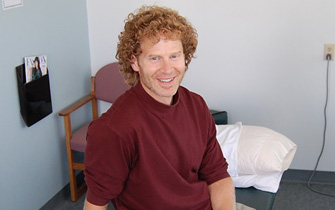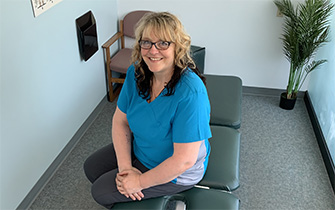Did you know that 7.6 million Canadians suffer from chronic pain? Chronic pain is very debilitating, and many of those afflicted continue to suffer in silence because it may be hard to get a diagnosis from the traditional medical community.

At Summit Physiotherapy, we service St. Albert and the Edmonton area and offer evidence-based chronic pain treatment to help you move better, feel stronger, and reclaim your daily life. Our licensed physiotherapists and massage therapists design personalized treatment plans that address not just your pain, but the root causes behind it.
What is chronic pain?
Chronic pain is defined as pain that lasts for more than 12 weeks, lingering an injury has healed. It can affect the muscles, joints, nerves, or connective tissue and often limits your ability to move, sleep, focus, function or work.
Common causes of chronic pain we treat
We treat many conditions associated with chronic pain, some include:
- Arthritis
- Fibromyalgia
- Whiplash injuries
- Chronic headaches or migraines
- Lower back pain
- Plantar fasciitis
- Achilles/rotator cuff tendinopathy
- Tennis elbow
- Sciatica
- Nerve pinching or compression (in neck or back)
Unsure if we can help treat your chronic pain? Contact our team today for more information about your chronic pain and how we can help.
What are common chronic pain symptoms?
As mentioned earlier in this post, chronic pain is any pain that lasts longer than three months. Since the reason behind chronic pain can vary drastically from person to person, symptoms of chronic pain will be as varied as the different injuries that cause the chronic pain.
Ask yourself the following questions to help you determine whether or not your pain is considered chronic:
- Has your pain gone away as expected after my injury?
- Can you describe your pain as shooting, burning, aching, or electrical?
- Are you experiencing on-going, constant discomfort, soreness, tightness, or stiffness?
- Is your pain disturbing your sleep, quality of life or work?
If you’re experiencing any of the above issues, contact us right away for treatment!
How physiotherapy helps chronic pain
Physiotherapy is one of the most effective, drug-free ways to manage and reduce chronic pain. At Summit Physiotherapy, we take a whole-body approach to treatment, combining education, movement, and hands-on care.
Your personalized treatment plan may include:
Manual therapy to release tissue tension and improve joint function.
Exercise therapy to rebuild strength, flexibility, and confidence.
Dry needling and IMS (intramuscular stimulation) for trigger point release.
Massage therapy to relax tight muscles and promote circulation.
Acupuncture for nervous system regulation.
Education and pacing strategies to manage flare-ups and avoid exacerbations.
Collaboration with mental health professionals.
What to Expect at Your Chronic Pain Treatment Session
We start by getting to know you—not just your pain, but your story.
During your initial visit:
- We review your pain history and medical background.
- Perform a functional movement assessment.
- Discuss your goals and daily challenges.
- Begin building a plan with short-term relief and long-term progress in mind.
- Start the appropriate treatment for you and give you stretches and exercises to help you manage your condition.
You’ll leave your first session with a clear understanding of what’s next—and support you every step of the way.
Why Trust Summit Physiotherapy for Your Health and Wellness?
Locally owned and proudly serving St. Albert for over 42 years!
Our therapists have over 148 years of combined experience in physiotherapy and massage therapy!
Personalized, one-on-one ‘hands-on’ approach for every patient, every visit.
We use evidence-based techniques and the latest technology for effective pain relief and recovery.
4.7 star rating from our satisfied clients.
We focus on long-term solutions – not just quick fixes.
Home exercise programs are customized for each client to ensure continued progress.
Our services are covered by insurance, making quality care accessible to everyone.
Convenient access to care is just a call or click away.
Find Support With Our Chronic Pain Treatment Team
Not sure which member of our team to work with? We can help! Contact our clinic today.
Frequently Asked Questions
What is the best cure for chronic pain?
Staying active. Keep your body moving. With many treatment techniques at our disposal, our therapists can help increase your activity level. We will help guide you on what activities are beneficial or harmful and the safest and most efficient ways to return to your activity of choice.
How to know if pain is acute or chronic?
The simplest answer is if your pain has lasted longer than three months, it is considered chronic. This is especially true if your pain is not improving and is remaining mostly the same or worsening.
Acute pain is due to an injury that occured recently, usually due to a specific incident and lasts less than three months.
What is the most common chronic pain condition?
For musculoskeletal chronic pain, some of the most common chronic pain conditions our team comes across include chronic lower back pain, neck pain, osteoarthritis, fibromyalgia, and headaches.
What causes chronic pain?
In physiotherapy, chronic pain is usually caused by an injury like a car accident, a fall, a repetitive or overuse injury, or a broken bone. This injury is what triggers the initial episode that leads to chronic pain.
With chronic pain, often the injury has resolved but the recovered tissues or their associated nerves become irritated and cause the tissues to be more sensitive to pain and irritation. In some cases, there can exist a psychological aspect to chronic pain where the pain is not associated with an injury but is associated with depression, anxiety and stress. This is referred to as psychogenic chronic pain.
How long can you live with chronic pain?
People can live with chronic pain for a lifetime, but most commonly, the pain will last for 6 months or longer. Unfortunately, some people live much of their lives with chronic pain. There is a higher correlation between those with chronic pain and depression, anxiety, and sleep disturbance.
What happens if chronic pain is left untreated?
If chronic pain is left untreated, it will often get worse and your daily activities will start to decrease and a person’s quality of life declines. Effective treatment for chronic pain includes physical therapy, an active lifestyle, medication and in some cases, psychological counselling.
How do you deal with chronic pain without medication?
Pain medication isn’t always necessary to treat chronic pain, but it isn’t necessarily always a bad thing. Medication can help reduce chronic pain and therefore help people remain active and reduce the psychological effects of chronic pain.
If a person is opposed to medication, then chronic pain can be dealt with by an effective physiotherapy treatment program, acupuncture, a prescribed exercise/stretching routine, massage therapy, appropriate activities, and counselling, just to mention a few key treatment ideas.
We recommend finding an appropriate activity that brings you joy like painting, sports, fishing, working with kids, volunteering, walking, or getting out and into nature to keep you active.
Is it normal to be in pain every day?
With chronic pain, daily pain is normal. Depending on the type or cause of the chronic pain, the pain can be constant or only felt with certain movements or activities.
Ready to find chronic pain relief?
You don’t have to live life in pain, we’re here to help! If you’re experiencing chronic pain, please contact us or book your appointment online.







